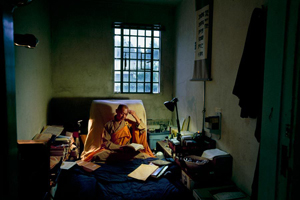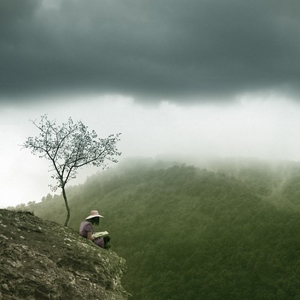I love reading. That’s evident in the creation of this blog. Books teach me what I didn’t know, break open my self-imposed boundaries, inspire my next steps, entertain me and enrich my hours. If you’re reading this, you know exactly what I mean.

But there’s something else about books we don’t often consider: books sustain us. Not in the physical sense, like food and water…but books can revive our psyche and spirit through their intrinsic messages of hope, faith or triumph; arouse our intellectual vigor; elicit laughter and tears, or evoke warm memories.
In the 1990’s, I attended a conference where Terry Waite was a featured speaker. In 1987, Waite was the envoy for the Church of England and was negotiating for the release of a group of hostages in Lebanon when he was taken captive himself. He spent close to four years in solitary confinement.
At the end of his talk (which culminated in an enthusiastic standing ovation), Waite shared some of the lessons that he had learned during that bleak period in his life. He talked about how grateful he was to know the joy of reading and the value of having read good books earlier in his life. He said that he had recalled passages and stories and those had helped him endure his terrible ordeal. His statements stayed with me.
I recently found a memoir, “Footfalls in Memory―Reflections from Solitude,” that Waite wrote after the autobiographical account of his time in captivity, “Taken on Trust.” A different kind of story, “Footfalls in Memory,” is a compilation of the books whose memories Waite relied upon to help him through those challenging years along with his review of some of the books that his captors eventually brought him to read.
In the book’s introduction, Waite expanded upon what I had recalled from his speech of years ago: “Solitary confinement taught me anew the delight and value of books.” Responding to the often-asked question, what he missed the most while in solitary confinement, Waite wrote, “Apart from the obvious — family, friends and freedom ― I missed books….I was forced to depend upon memory and travelled back across the years to recall books I had read during my life. I made a list in my mind of those I had read during my childhood…I even dreamt about books.”
Waite’s situation was the exact opposite of the one that so many readers face: “so many books, so little time.” Like a starving person, he devoured any and all of the books that his captors brought him. He wrote, “Books appeared to which I would not have given a second thought in the outside world.” For instance, Waite was surprised to find that he thoroughly enjoyed the Dorothy L. Sayers mystery series featuring Lord Peter Wimsey. I’ve also read those charming whodunits and echo his delight.

Waite offers a good reminder about the sheer joy of reading. I love few things more than curling up and delving into an entertaining book. I am among the world’s best escape artists. Yet the stories, passages and phrases in my pure escapism books are like chocolate ice cream…a favorite guilty pleasure, but probably not good to rely on as the only thing I ever eat.
I mused about the books that I might count on to sustain me in a situation like Waite’s, and which few would I choose to have with me, if given that choice. Most of us will (hopefully) never experience a hardship exactly like that, but most of us will go through those times aptly described as “the dark night of the soul.”
It was a hypothetical question but it proved an intriguing deliberation. To further exercise my curiosity, I engaged a small group of friends (who read voraciously, enjoy multiple genres and have fairly heterogeneous backgrounds), in an unscientific and informal survey and asked about their own top choices.
Not surprising, The Holy Bible and The Torah were on several lists. Other top choices were, “The Complete Works of William Shakespeare,” and J.R.R. Tolkien’s, “The Lord of the Rings,“ trilogy. A number of people cited a more recently published work, “Unbroken: A World War II Story of Survival, Resilience, and Redemption,” the inspiring biography of Louie Zamperini, authored by Laura Hillenbrand.
More striking to me than the similar choices, was the diversity. Their lists included some books that I would not have thought of, and even a few that I had not heard of, but that I have added to my reading “wish list.”
I didn’t ask the readers to explain why they opted for the books they did (perhaps that is a topic for a future discussion), but simply what they might choose. What is clear is that the books that sustain any one person are as distinctive as the readers themselves.
One of my favorite answers, which most writers will appreciate, was: “a thick blank book and a gross of pencils.”
Listed below is a sample of the other top choices, listed alphabetically.
The books that sustain us are not static or limited choices: we build upon them as we add to our reading coffers and as we recall others from our pasts. What is truly important is that we read them at all.
As we embark on this New Year (and I upon this new blog), I leave you with one question:
What are the books that sustain you?
Some Top Choices From Readers:
•A Short History of Nearly Everything (Bill Bryson) •A New Earth: Awakening to Your Life’s Purpose (Eckhart Tolle) •A World Lit Only by Fire: The Medieval Mind and the Renaissance: Portrait of an Age (William Manchester) •Bel Canto (Ann Patchett) •Blindness (José Saramago) •Catcher in the Rye (J. D. Salinger) •Endurance: Shackleton’s Incredible Voyage (Alfred Lansing) •Four Quartets (T. S. Elliot) •How Green was my Valley (Richard Llewellyn) •Just Kids (Patti Smith) •Letters to Sam: A Grandfather’s Lessons on Love, Loss and the Gifts of Life (Daniel Gottlieb) •Man’s Search for Meaning (Viktor E. Frankl) •Moby Dick (Herman Melville) •Of Human Bondage (W. Somerset Maugham) •On the Road (Jack Kerouac) •Our Man in Havana (Graham Greene) •R.S. Thomas Collected Poems, 1945-1990 (R.S.Thomas) •Still Alice (Lisa Genova) •Strong at the Broken Places: Voices of Illness, a Chorus of Hope (Richard M. Cohen) •The Adventures of Huckleberry Finn (Mark Twain) •The Clan of Cave Bear (Jean M. Auel) •The Great Divorce (C. S. Lewis) •The Greatest Generation (Tom Brokaw) •The Listener (Taylor Caldwell) •The Poetry of Robert Frost: The Collected Poems (Robert Frost) •The Poisonwood Bible (Barbara Kingsolver) •The Prince of Tides (Pat Conroy) •The Source (James A. Michener) •To Kill a Mockingbird (Harper Lee) •Walden (Henry David Thoreau)